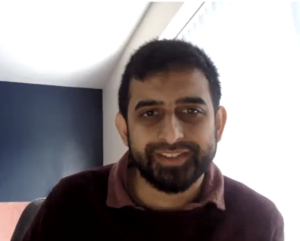
Fasihul Khan, M.D., Ph.D., is a consultant at Glenfield Hospital, University Hospitals of Leicester NHS UK. Dr. Khan’s team submitted a research proposal to access Vivli to conduct analysis relevant to their topic, “A systematic review and individual patient data meta-analysis of physiological biomarkers in idiopathic pulmonary fibrosis”. The team’s completed research has been presented to the research community at conferences and in publications including American Journal of Respiratory and Critical Care Medicine. He sat down with Vivli to tell us more about accessing individual participant data to advance his research, and the potential for biomarkers to predict outcomes for people with pulmonary fibrosis.
Please tell us more about your research – what led you to want to research this particular topic?
So my area of interest is pulmonary fibrosis, which is a condition causing scarring of the lungs. Pulmonary fibrosis is a relatively rare condition, and therefore the number of studies in this area are limited, although expanding rapidly. I was keen to synthesize some of the existing information that was already available. I wanted to perform a systematic review, specifically looking to see whether there are blood biomarkers that can predict outcomes in patients with diagnosed pulmonary fibrosis. When I started searching the literature, it very quickly became apparent that there were several published studies, but actually the data and the way the studies were reported were very heterogeneous. Individually the studies yielded inconsistent results, utilized data-dependent thresholds, and frequently did not adjust for confounders. Therefore, I sought individual participant data which helped overcome these limitations and enabled robust data analyses to be performed leading to reliable conclusions.
Could you talk about what it was like to work across multiple data-sharing platforms; how did you handle that?
This was not straightforward! I created summary estimates from each study separately on the different platforms in Vivli and in CSDR, then imported them manually onto my own database. I then used additional software to pool the summary estimates. Having the data all in one place would have saved me a lot of time and stress!
Not a lot of researchers have the perseverance to do what you did. What advice would you give to researchers before they start off? Things you wish you’d known before you started?
I think it’s important to consider the project as a whole. It is highly likely the process will take much longer than you think, and that’s not necessarily any individual or organization’s fault. You need to have a clear understanding with contingency plans for each stage, and give yourself plenty of time! Be clear about your research question, and whether individual participant data are likely to improve your research, before committing to the additional effort. Speak to others who have been through the process of acquiring individual participant data, and your institution to understand timescales for data sharing agreements as these are likely to be time consuming and potential limiting factors.
Once you were able to access the individual patient data, were you able to get past the reporting limitations and find what you needed?
Absolutely; once we had the raw data, we were able to perform our analysis and produce some very meaningful results, which we have subsequently published in two journals. The first was a blood biomarker paper in the European Respiratory Journal which was the first blood biomarker study in pulmonary fibrosis to utilize this approach, and provides robust estimates of the association between matrix-metalloproteinase 7 and disease progression.
The second paper was published in the American Journal of Respiratory Critical Care Medicine. In this paper, we looked at change in FVC which is a lung function measurement used to assess progression in pulmonary fibrosis. All interventional clinical trials measure FVC as an endpoint – typically at 12 months, but patients have additional FVC measurements at baseline, 3, and 6 months. The purpose of our research was to evaluate whether short term changes in FVC i.e. over three-months, are associated with overall mortality. In other words, can we shorten clinical trials by finding an earlier signal than the 12 months FVC change that is currently accepted by regulators. Since the association between short term FVC change and mortality was not reported in any clinical study, we needed the individual participant data to model this association. Indeed, we were able to find that three-month FVC change is associated with mortality, and perhaps more importantly a treatment effect could be observed between treatment and placebo arms at three-months. The findings of this study have been well received by the research community, and have already been adopted into the design of an adaptive trial in IPF. Lots of hard work, but worth it as the results are likely to generate further research which ultimately will hopefully impact patients in a positive manner!

